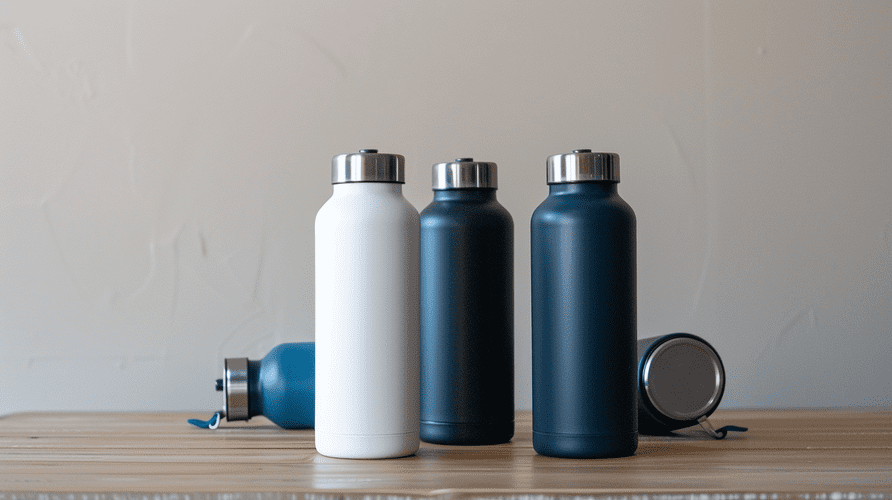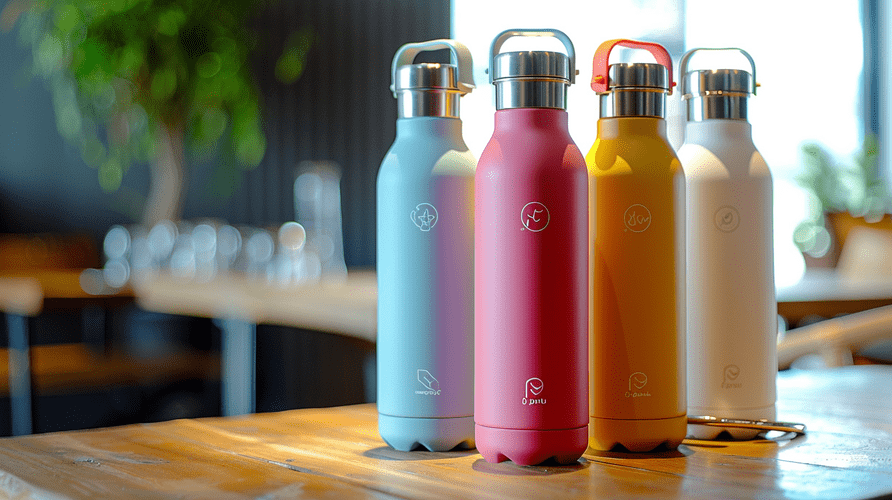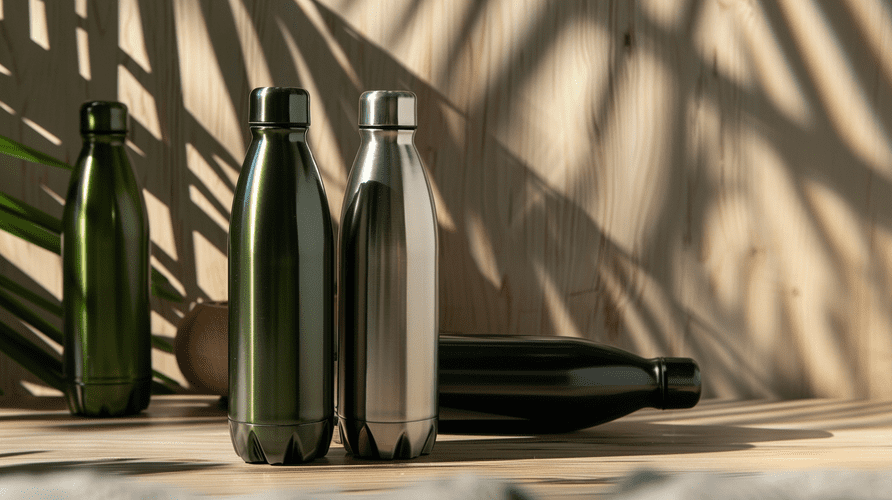Are you struggling to find reliable online suppliers for eco-friendly water bottles? It's tough. You need quality, sustainability, and a partner you can trust for your B2B needs.
Finding trustworthy online B2B suppliers for truly eco-friendly water bottles involves looking for manufacturers or established wholesalers with transparent practices, good certifications, and a focus on durable, recyclable materials like high-quality stainless steel. Direct sourcing can often provide these assurances.

It's a big market out there. Many suppliers claim to be "eco-friendly." But as a business owner or procurement officer, you need more than just claims. You need real facts and products that align with your brand's values and your customers' expectations. I've been in this stainless steel drinkware business for years with Icobottle, and I've learned a lot about what separates the genuine eco-friendly options from the rest. Let's explore what to look for, especially when you're buying in bulk. For someone like Mark Shenng in Canada, who values quality and fair pricing for his rebranding business, these details are crucial.
What is the Most Environmentally Friendly Water Bottle to Source?
Choosing the "most" eco-friendly option feels overwhelming, right? So many materials, so many claims. You want a product that genuinely lessens environmental impact, not just one that's cleverly marketed.
High-quality stainless steel, particularly food-grade 304 or 316, is often your best bet. Its long lifespan significantly reduces waste, and it is highly recyclable at the end of its life. This makes it a leading sustainable choice for businesses.

When I talk to procurement officers, especially those new to sourcing stainless steel1 products, the question of "what's truly green?" always comes up. It's a valid concern. We see a lot of "greenwashing" in the market. So, let's break down why stainless steel stands out from a B2B perspective.
Understanding Material Impact
The term "eco-friendly" isn't just about whether something can be recycled. It's about the entire lifecycle.
- Durability: A key factor for stainless steel is its incredible durability. Unlike some other materials, it doesn't break easily. This means a longer product life. For your customers in America or Europe, this translates to less frequent replacements and less waste ending up in landfills. From my experience manufacturing at Icobottle, a well-made stainless steel bottle can last for many, many years. This longevity is a cornerstone of true sustainability.
- Recyclability: Stainless steel is one of the most recycled materials on the planet. It can be melted down and reused to create new products without losing its quality. This closed-loop potential is vital. When you're sourcing in bulk, consider the end-of-life for these products. Offering something that can be easily and effectively recycled adds huge value to your eco-conscious brand.
- Production: While all manufacturing has an impact, stainless steel production has become more efficient. Reputable suppliers often have measures to minimize their environmental footprint. It's always good to ask potential suppliers about their manufacturing processes.
Comparing Stainless Steel to Other Options
Let's briefly see how it stacks up for a business buyer:
| Material | Pros for Eco-Friendliness | Cons for Eco-Friendliness/B2B | My B2B Take |
|---|---|---|---|
| Stainless Steel | Highly durable, highly recyclable, inert | Higher energy in initial production | Best long-term value and environmental performance for quality-focused B2B. |
| Glass | Recyclable, inert | Breakable (shipping risk!), heavier | Good, but logistical challenges for bulk international shipping. |
| Aluminum | Lightweight, recyclable | Often lined (BPA concerns?), dents | Lighter for shipping, but ensure lining is safe and quality is high. |
| Recycled PET | Uses recycled materials | Can degrade, microplastic concerns | A step up from virgin plastic, but not as durable or inert as steel. |
| Bioplastics | Plant-based | Composting infrastructure needed | Promising, but check true biodegradability and sourcing. |
For a B2B buyer like Mark, who needs to ensure quality for rebranding, the robustness and premium feel of stainless steel usually outweigh the slightly higher initial production energy, especially when considering the lifespan and recyclability2.
What are the Healthiest Water Bottles to Buy in Bulk?
Worried about what your customers are drinking from? It's a major concern. Harmful chemicals leaching into water is a risk you absolutely want to avoid for your brand's reputation.
Food-grade stainless steel bottles are among the healthiest choices. They are inherently inert, meaning they don't react with liquids, and are naturally BPA-free. This ensures no unwanted chemicals leach into the contents, providing a safe hydration experience.

Health and safety are non-negotiable, especially when you're putting your company's logo on a product. As a manufacturer, Icobottle prioritizes material safety above all else. We know that startup bosses and procurement officers from large companies alike need this assurance. Let's dive into why stainless steel is a top pick for health-conscious sourcing.
The Purity of Stainless Steel
The main advantage of stainless steel, particularly grades like 304 (18/8) or 316, is its non-reactive nature.
- No Chemical Leaching: Unlike some plastics, stainless steel doesn't contain chemicals like BPA (Bisphenol A), phthalates, or other endocrine disruptors that can leach into water, especially when exposed to heat or over time. This is a huge selling point for health-aware consumers in markets like America and Europe. I've seen firsthand how important "BPA-Free" labeling is.
- Resists Bacteria and Mold: The non-porous surface of stainless steel makes it very hygienic. It's less likely to harbor bacteria, mold, or other germs compared to materials with more texture or pores, provided it's cleaned regularly. For businesses, this means a product that maintains its integrity and safety with standard care.
- No Lingering Flavors: Stainless steel doesn't absorb flavors or odors from previous drinks. So, if you have coffee in it one day and water the next, there's no taste transfer. This enhances the user experience, which is important for repeat business and positive reviews.
Verifying Material Safety for B2B Orders
When you're sourcing stainless steel water bottles, especially from overseas suppliers in China or Vietnam, it's crucial to verify the claims.
- Ask for Material Certifications: Reputable suppliers should be able to provide test reports or certifications for the grade of stainless steel used. This shows they've done their due diligence. At Icobottle, we make these readily available to our B2B clients.
- Understand "Food-Grade": Ensure the steel is specified as "food-grade." This means it's been determined safe for contact with food and beverages.
- Quality Control Processes: Inquire about the supplier's quality control. How do they ensure consistency and safety across a large production run? This is a key area where communication, as Mark Shenng pointed out as a pain point, is vital. Clear, efficient communication about QC can prevent many headaches.
Consider this table for quick reference:
| Feature | Stainless Steel Advantage | Implication for B2B Buyers |
|---|---|---|
| BPA-Free | Naturally free of Bisphenol A | Strong marketing point; meets consumer health demands. |
| Non-Leaching | Does not release chemicals into liquids | Ensures product safety and protects your brand's reputation. |
| Non-Reactive | Doesn't affect taste or odor of contents | Better user experience, leading to customer satisfaction. |
| Hygienic Surface | Resists bacteria and mold growth | Easier to clean, maintains health standards. |
| Durability | Long-lasting, doesn't degrade into harmful microparticles | Reinforces both health and eco-friendly credentials. |
By focusing on high-quality stainless steel, you are inherently choosing a path that prioritizes the health of the end-users. This is a responsible choice that also makes good business sense.
What are the Disadvantages of a Stainless Steel Water Bottle for Wholesale?
Stainless steel sounds great, but are there downsides? Yes, every product has them. Knowing these helps you make a fully informed purchasing decision, especially for bulk orders.
From a B2B perspective, stainless steel bottles can have a higher unit cost than some plastics. Their weight can also increase bulk shipping expenses, which is a key consideration for wholesale.

It's important to have a balanced view. While I champion stainless steel for its many benefits, as a businessperson, I also understand that procurement officers like Mark Shenng are sensitive to costs and logistics. Let's look at these potential drawbacks and how we at Icobottle, and other good suppliers, address them for our B2B clients.
Cost Considerations for Bulk Purchases
One of the first things B2B buyers notice is the unit price.
- Initial Investment: High-quality food-grade stainless steel is more expensive to source and manufacture than many types of plastic or lower-grade metals. This means the upfront cost per bottle will likely be higher. When you're ordering thousands of units, this difference adds up. However, I always advise clients to think about the total cost of ownership and the perceived value. A premium product commands a premium price in the retail market.
- Value Proposition: The durability and longevity of stainless steel mean it offers better long-term value. While the initial outlay is more, the product lasts longer, potentially leading to higher customer satisfaction and less need for replacements under warranty, if you offer one. It’s about balancing that initial cost with the quality and lifespan that your brand, like Mark's in Canada, wants to be known for.
Logistical Factors: Weight and Shipping
The physical nature of steel also plays a role.
- Weight: Stainless steel is denser and heavier than plastic or aluminum. For large international shipments, say from China to America or Europe, this increased weight directly translates to higher shipping costs. This is a real factor for procurement officers managing budgets. We try to optimize packaging to be as light and compact as possible without compromising protection.
- Potential for Denting (if lower quality): While durable, stainless steel isn't indestructible. Lower-quality, thinner stainless steel can be more prone to denting if dropped. This is why sourcing from a supplier who uses robust steel grades is essential. It’s a quality inspection point that Mark rightly focuses on. We ensure our products use steel of sufficient thickness to withstand typical daily use.
- Temperature Conductivity: Standard single-wall stainless steel bottles conduct heat. This means hot liquids will make the bottle hot to touch, and cold liquids will cause condensation. This isn't a disadvantage of the material itself, but of a basic design. That's why double-wall vacuum insulated stainless steel bottles are so popular – they solve this issue entirely, keeping drinks hot or cold for hours without affecting the outer temperature. Of course, insulated bottles are more complex to make and thus have a higher unit cost.
Mitigating Disadvantages with a Good Supplier
A reliable supplier can help mitigate these potential downsides:
- Quality Assurance: Good quality control (QC) ensures you get the steel grade you paid for, minimizing issues like easy denting or rust (which shouldn't happen with proper food-grade stainless steel). This addresses a key pain point for buyers like Mark who have experienced certificate fraud or quality issues.
- Efficient Logistics Support: Experienced exporters understand how to optimize packaging and work with freight forwarders to manage shipping costs as effectively as possible. Clear communication about shipment schedules is also key to avoiding missed sales seasons.
- Transparent Pricing: Understanding the cost breakdown helps. While steel is a commodity and prices fluctuate, a good supplier will be transparent.
Here’s a quick summary of potential B2B challenges:
| Disadvantage Category | Specific Issue | How a Good B2B Supplier Addresses It |
|---|---|---|
| Cost | Higher initial unit price vs. some alternatives | Emphasizes long-term value, premium quality, efficient production. |
| Logistics | Heavier, potentially increasing shipping costs | Optimized packaging, experienced shipping coordination. |
| Physical Properties | Can dent (if low quality/thin); conducts heat (single-wall) | Uses appropriate steel thickness; offers double-wall vacuum insulation options. |
| Sourcing Risks | Inconsistent quality; certificate issues | Strong QC processes, transparent documentation, reliable communication. |
Understanding these aspects allows you, as a procurement officer or business owner, to weigh the pros and cons accurately and choose the best stainless steel water bottle options for your specific market and business model.
Conclusion
Sourcing eco-friendly, healthy bottles online means focusing on quality stainless steel from transparent B2B suppliers who can verify materials and processes. This ensures product integrity for your brand.

